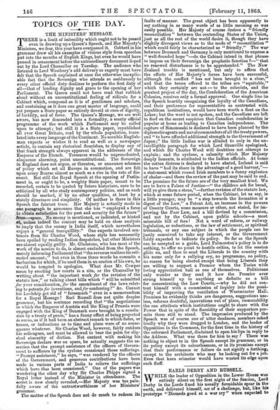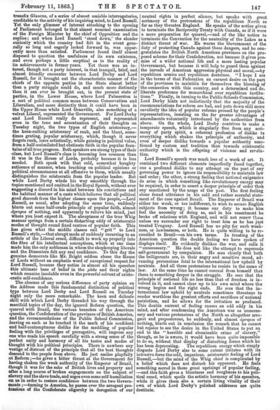transfix Glaucus, of a series of almost amiable interrogatories, creditable
to the activity of his inquiring mind, to Lord Russell.
Yet the only glimmer of interest attaching to the opening of Parliament belonged to that almost nominal examination of the Foreign Minister by the chief of Opposition and the replies ; and when Lord Russell 'stood down,' the slender curiosity which the country had felt in the event gene- rally so long and eagerly looked forward to, was appar- ently more than satisfied. Parliament found itself almost disposed to question the usefulness of its own existence, and even perhaps a little sceptical as to the reality of its achievements in former years. Yet there was an in- terest, though not a party interest, in that tranquil, brief, and .almost friendly encounter between Lord Derby and Lord Russell, for it brought out the characteristic manner of the -chiefs of the opposite parties in the State almost better than a party struggle could do, and much more distinctly than it can ever be brought out, in the present state of parties, in the Lower House, where Lord Palmerston is a sort of political common mean between Conservatism and Liberalism, and more distinctly than it could have been in the Upper House while Lord Granville, also something of a velvet Liberal, represented the Government. For Lord Derby and Lord Russell really do represent, and represented oven in the tone and accentuation of their thoughts on Tuesday night, the two types of English aristocracy,— the keen-cutting aristocracy of rank, and the blunt, some- times grating, popular aristocracy, which, though it never forgets rank, loses artistically, while gaining in political value, from a half-assimilated but obstinate faith in the popular foun- tains of all true progress. Both speakers are strong types of their -class, but Lord Russell's class is becoming less common than it was in the House of Lords, probably because it is less needed. Both speak with that cold, somewhat haughty reticence of manner, when touching on political opinions or political circumstances at all offensive to them, which usually distinguishes the aristocratic from the popular leader. But while Lord Derby winds his way smoothly through the topics mentioned and omitted in the Royal Speech, without ever suggesting a discord in his mind between his convictions and the habitual manner of a caste which believes that all political good descends from the higher classes upon the people,—Lord Russell, as usual, after adopting the same tone, suddenly blurts out some half-crude principle of popular faith, almost .apropos of nothing, and apparently to relieve his mind, just where you least expect it. The abruptness of the true Whig manner springs from a certain disturbing eddy of aristocratic modes of thought round fixed centres of popular faith. This has given what the middle classes call " grit " to Lord Russell's style,—that abrupt mode of suddenly recurring to an article of the Liberal creed, difficult to work up properly into .the fibre of his intellectual conceptions, which at one time made him the only nobleman in whom the shopkeeping liberals and the Dissenters felt any real confidence. To this day the genuine democrats like Mr. Bright seldom abuse the House of Lords without an emphatic word of exceptional respect for Lord Russell, because they notice in almost all his speeches this ultimate base of belief in the plebs and their rights which remains insoluble even in the powerful solvent of aristo- cratic self-confidence.
The absence of any serious difference of party opinion on the Address made this fundamental distinction of political type between Lord Derby and Lord Russell on Tuesday night only the more remarkable. The keen and delicate skill with which Lord Derby threaded his way through the manifold topics of the day, the ignored Reform question, the quarrel with Brazil, the various branches of the American question, the Confederation of the provinces of British America, and the recommendations of the Public School Commission, leaving on each as he touched it the mark of his confident and half-contemptuous dislike for the meddling of popular feeling with the privileges of prerogative, will impress any one who reads his speech carefully with a strong sense of the perfect unity and harmony of all his tastes and modes of thought with his political principles. There is nowhere any vestige of distrust of the principle that all the best thoughts descend to the people from above. He just smiles playfully at Reform ;—he gives a bitter thrust at the Government for having shaken the weak authority of the Emperor of Brazil, though it was for the sake of British lives and property and after a long course of broken engagements on the subject of slavery and the slave trade, and urges even some self-humiliation on us in order to restore confidence between the two Govern- ments ;—turning to America, he passes over the arrogant pre- tensions of the Confederate oligarchy in derogation of our neutral rights in perfect silence, but speaks with great acrimony of the pretensions of the republican North so far as they threaten England. He speaks of the notice given to terminate the Reciprocity Treaty with Canada, as if it were a mere preparation for quarrel,—and of the like notice to terminate the Convention for the neutrality of the Lakes as a distinct threat of war. He warns the Government of the duty of protecting Canada against these dangers, and he con- gratulates the British North American provinces on the pro- posed scheme for their Confederation, not because it gives pro- mise of a wider national life and a more lasting popular Government, but because it will help to guard them against the inroads of American aggression physical and moral,—by republican armies and republican doctrines. "I hope I see in the terms of that Federation an earnest desire on the part of the provinces to maintain for themselves the blessing of the connection with this country, and a determined and de.. liberate preference for monarchical over republican institu- tions." Finally, in turning to the Public Schools Commission, Lord Derby hints not indistinctly that the majority of the recommendations for reform are bad, and puts down still more cavalierly the idea of popular reforms pressed by the people's representatives, insisting on the far greater advantages of amendments voluntarily introduced by the authorities from above. On the whole, Lord Derby contrives to make a temperate speech, which is singularly free from any acri- mony of party spirit, a coherent profession of dislike to everything which shakes the principle of authority, and even of deeper dislike towards a popular authority sanc- tioned by custom and tradition than towards aristocratic authority which is the offspring of violence and revolu- tion.
Lord Russell's speech was much less of a work of art. It contained two different elements imperfectly fused together, one a profound dislike to any attempt on the part of any governing power to ignore its responsibility to maintain law and order; the other, a strong feeling that national exigencies do arise in which something like revolutionary energy may be required, in order to assert a deeper principle of order than any sanctioned by the usage of the past. The first feeling alone found utterance in his cold and rather scornful state- ment of the case against Brazil. The Emperor of Brazil was either too weak, or too indifferent, to wish to secure English. subjects from wrong ; it became our duty to make him feel the necessity of doing so, and in his resentment he broke off relations with England, and will not renew thaia unless we surrender our right to treat him as he has just treated Uruguay. Lord Russell has no pity for such weak- ness, or lawlessness, or both. He is quite willing to be re- conciled to Brazil—on his own terms. In treating of the American question the double feeling we have spoken of displays itself. He evidently dislikes the war, and calls it " unnecessary." He does not like the attempt to supersede self-government by compulsion. He sees clearly that both the belligerents are, in their angry and sensitive mood, ad- vancing pretensions fatal to the international law upheld by neutrals. And all these pretensions he resists in the name of law. At the same time he cannot conceal from himself that there is something deeper in the struggle. He sees that the principle of national life no less than that of freedom is in- volved in it, and cannot clear up to his own mind where the wrong begins and the right ends. He sees that the in- ternational law upheld by neutrals sometimes threatens to render worthless the greatest efforts and sacrifices of national patriotism, and he allows for the irritation so produced.
This double current of feeling causes an odd eddy in his mind, and after condemning the American war as unneces- sary and various pretensions of the North as altogether arro- gant and preposterous, he suddenly, and almost apropos of nothing, blurts out in conclusion the remark that he cannot bat rejoice to see the desire in the United States to put an end to the " horrible and abominable crime of slavery," though, as he is aware, it would have been quite impossible to do so, without that display of disturbing forces which he has been deprecating. The republican energy which simply disgusts Lord Derby also to some extent irritates with its intrusive force the cold, imperious, aristocratic feeling of Lord Russell,—but the mind of the Whig chief is complicated by a belief which does not disturb his opponent. He feels something sacred in these great uprisings of popular feeling, —and this faith gives a bluntness and roughness to his poli- tical creed, which spoils the artistic harmony of his speeches, while it gives them also a certain living vitality of their own of which Lord Derby's polished addresses are quite destitute.































 Previous page
Previous page